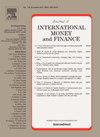气馁的借款者和情感冲击
IF 3.3
2区 经济学
Q2 BUSINESS, FINANCE
引用次数: 0
摘要
我们首次在文献中量化了通过悲观情绪冲击影响气馁的银行借款人的三个渠道。虽然气馁的借款人的存在并不是一个新现象,但我们的研究提出了一种分析方法,将情绪驱动的冲击置于理解这些行为的最前沿。使用来自欧洲中小企业的约90,000个公司层面的观察样本,我们发现来自信贷需求,信贷供应以及在某种程度上通货膨胀的较高水平的悲观情绪冲击与企业气馁的概率呈正相关。总的来说,这些结果对内生性、选择偏差和替代规范都是稳健的。我们的研究结果揭示了情绪驱动因素对企业借贷行为的深刻影响,对政策制定者和金融机构都具有实际意义。本文章由计算机程序翻译,如有差异,请以英文原文为准。
Discouraged Borrowers and Sentimental Shocks
We quantify, for the first time in the literature, the three channels affecting discouraged bank borrowers through pessimistic sentimental shocks. While the existence of discouraged borrowers is not a new phenomenon, our research puts forward an analytical approach that places sentiment-driven shocks at the forefront of understanding these behaviors. Using a sample of around 90,000 firm-level observations from European SMEs, we find that a higher level of pessimistic sentimental shocks from credit demand, credit supply, and, to some extent, inflation is positively related to the probability of firms being discouraged. These results are, in general, robust to endogeneity, selection bias, and alternative specifications. Our findings unveil the profound impact of sentiment-driven factors on the borrowing behavior of businesses and have practical implications for both policymakers and financial institutions.
求助全文
通过发布文献求助,成功后即可免费获取论文全文。
去求助
来源期刊

Journal of International Money and Finance
BUSINESS, FINANCE-
CiteScore
4.20
自引率
4.00%
发文量
141
期刊介绍:
Since its launch in 1982, Journal of International Money and Finance has built up a solid reputation as a high quality scholarly journal devoted to theoretical and empirical research in the fields of international monetary economics, international finance, and the rapidly developing overlap area between the two. Researchers in these areas, and financial market professionals too, pay attention to the articles that the journal publishes. Authors published in the journal are in the forefront of scholarly research on exchange rate behaviour, foreign exchange options, international capital markets, international monetary and fiscal policy, international transmission and related questions.
 求助内容:
求助内容: 应助结果提醒方式:
应助结果提醒方式:


